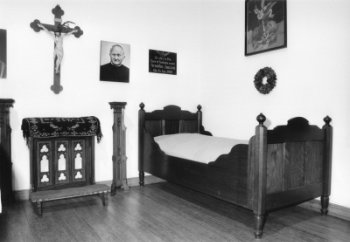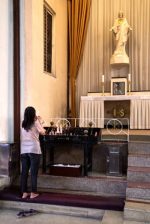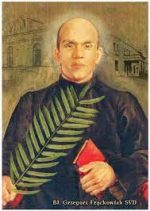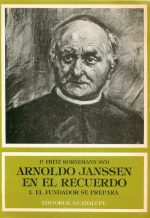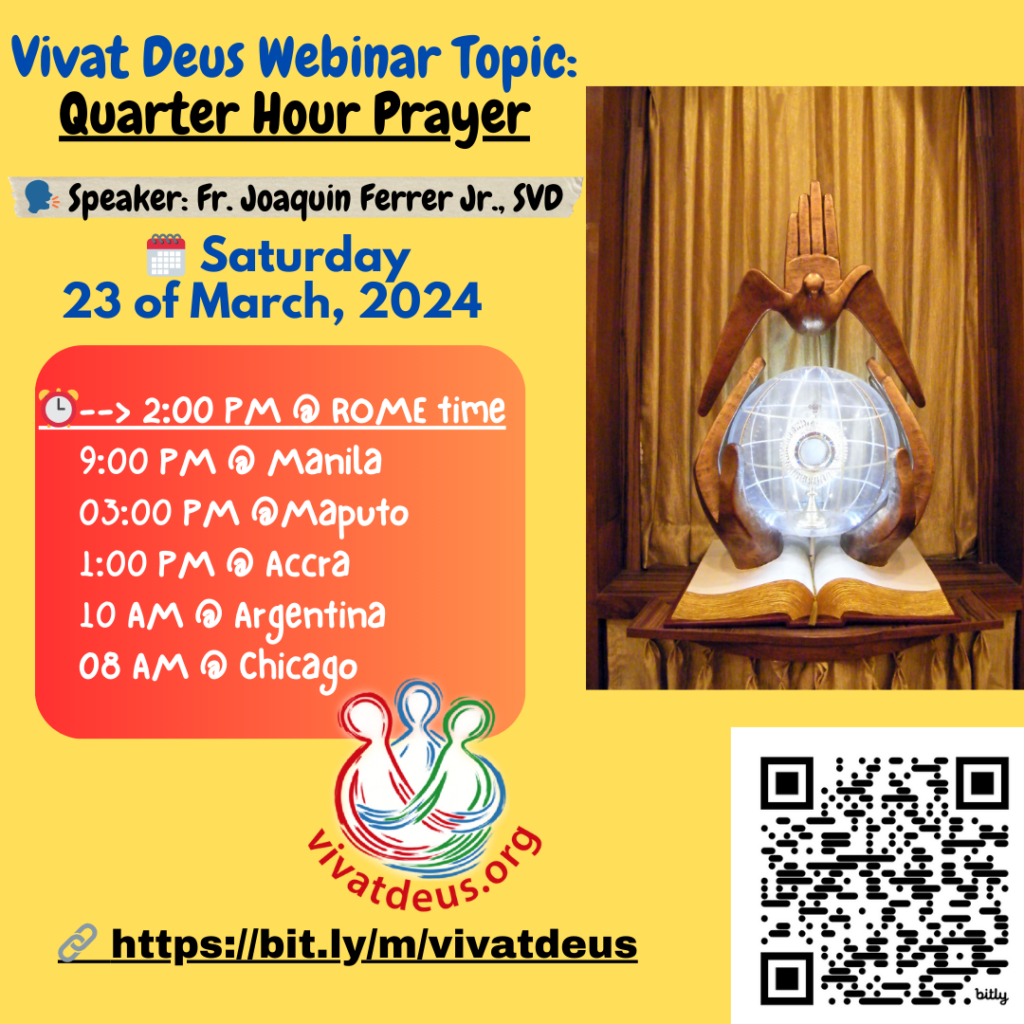In the Cross, Fr. Arnold saw the great gift of God’s Love to save the world, the inconceivable mystery of God’s transforming power which can open human hearts for others and the way to a joyful Easter.
The early logo of the Society of the Divine Word includes a cross perched on a hill, similar to the one on Calvary. This prominent symbol represents the firm foundation of Arnold Janssen’s missionary work. The evangelic grain of wheat must fall and eventually die before it yields an abundant harvest. The Founder’s missionary journey on a personal, historical, theological and pedagogical level was deeply experienced in the realm of Christ’s Passion and Death on the Cross.
Arnold’s unfolding appreciation of the Cross
Arnold’s first cherished and memorable experience of the cross was when he was nine years old. During a visit to a relative on a farm in Heulm, his mother stopped with him at a church to do the Stations of the Cross. The sight and memory of his mother clasping a prayer book and kneeling on the stone floor, reciting prayers from one station to the other, inspired the young Arnold. This experience initiated his particular love for the Way of the Cross which he then prayed throughout his life. Josef Kleintitschen, Arnold’s student at the Ursulines in Kempen, remembered that Arnold liked to speak during classes about the Passion of Christ as narrated by the highly esteemed Anne Catherine Emmerich. When Arnold’s father, Gerhard, passed away (1870), Arnold invited his family to the church to pray first the Way of the Cross, then to celebrate Mass for the late father.
The Society’s historical introduction to the school of the Cross
The draft statutes of the Mission House (Spring 1876) resolved that the Way of the Cross was to be considered as one of the spiritual means to support the missionaries, and later also our benefactors. In the silence of the Cross, Arnold pondered the Will of God and, like the Apostle Andrew (a particular patron of the Society), he stood under the Cross listening to the guidance of the Holy Spirit. In every house, there was to be a large statue of the Mater Dolorosa which the Founder used to venerate at the end of his Way of the Cross. Fr. Arnold decided to dedicate the first Mission House on German soil to the Holy Cross (Heligkreuz: 1892). Afterwards, his spiritual sons followed his example by regularly practicing the Way of Cross in their chapels and at cemeteries.
In his time of great optimism and unshakable faith in scientific progress, Fr. Arnold was attracted by great developments and inventions. However, he also perceived the illusiveness and limits of “optimistic growth” devoid of a more rigorous view of human reality. He embraced the religious notion that God’s way of a successful life comes along with Christ’s love on the Cross.
Arnold’s personal experience of the Cross
Fr. Arnold, immersed in the Mysterium Crucis, found constant light in the hardest tests of life. His first great biographer, Hermann Fischer (1867- 1945) noted that his secretaries had the best opportunities to observe him carefully. Fischer commented, “They all expressed their astonishment at the calm and resignation with which he accepted painful occurrences and bitter disappointments which were quite numerous in his life. When, upon one occasion, he received distressing news, reports one of the secretaries, and I expressed my condolence, he turned and said, ‘I am used to such blows; let us pray that good may come of them.’ He never once lost his composure; and soon after, during the recreation period, he was as kind and cheerful as ever. Nobody could have imagined what a heavy affliction had befallen him. I have often been surprised, reports another, how quietly he took ‘bitter pills’. His confidence in God was the rock on which he stood, unmoved in the midst of all storms and tribulations.”
Arnold’s theological musings on the Cross
Over time, Fr. Arnold viewed the cross more and more from the viewpoint of the Holy Trinity. The ceremony of bestowing mission crosses (missionary sending), which started in 1879, focused principally on the essence of the mission to preach the Cross and the love of the Heart of Jesus manifested entirely on the Cross. Since 1895, the missionary sending addressed particularly the mystery of the Holy Trinity, where the Father, the Son, and the Holy Spirit are bestowing the cross on the missionary. For the Founder, the Cross was a prerequisite of God’s blessing. He believed that every good work, every new foundation should be firmly grounded on Calvary. That was particularly experienced at the beginning of the Mission House at Steyl, when there were staggering sufferings (he called them the particles of the cross of Christ), including the first companions leaving his work. About this Fr. Arnold wrote, “I have begged Him that, if we are not totally in accord with His divine will, He let us collapse into nothingness as soon as possible”. On the occasion of the first anniversary of the Mission House in Steyl, Fr. Arnold thanked the good God for the cross and sufferings sent to the community during the past year. Also, in Nysa, there were violent storms of opposition and complaints among the confreres for many reasons. Fr. Arnold responded, “You are just beginning to suffer, but I have already suffered much (…) I consider it a good sign that suffering and crosses mark our beginning. Everything that is good must be paid for with pain. That is God’s way of doing things. If the dear God wants the work, it will succeed.” He saw that God often tests his servants and sees if they have confidence.
The ‘School of the Cross’ implications for formation
The Founder’s experiences of the cross entailed some practical implications for formation:
-The importance of sacrifice
Sacrifice is a needed element for a stable foundation for religious obedience, brotherly love, and faithful observance of virtues and the Constitutions. The Founder wrote to Fr. Lux in St. Gabriel, “We become men, not because we can work but because we can suffer.” Fr. Joseph Freinademetz said, “Anyone who makes it easy for himself is not a good missionary.” At the conclusion of Vatican II, the Superior General, Fr. Johannes Schütte, contributed the Exercitium annuum (1965) on the theme “A Community of Sacrifice”. He highlighted as an objective not to overlook the narrow gate of Christ’s discipleship that is needed to revitalize our SVD fellowship in sacrifice, in and with Christ, right at a time when self-denial, sacrifice, and renunciation seemed old-fashioned to many.
-The need for strength and courage
that Fr. Arnold conveyed to Fr. Freinademetz in a letter dated January 30, 1885, “The greater the distress, so much the greater will be the light and the strength! Just keep on courageously hoping in the Lord! (…) So when there is a storm all around you, don’t give up. (…) So stand up in the storm like an oak, and strengthen your confreres”.
-Patience and humility
Patience and humility are preconditions for productive missionary work. To the impatient missionaries, desiring to own their mission in China quickly, the Founder proposed to use the time of waiting for deepening their spiritual life through meditation and spiritual reading, for learning the language, for getting acquainted slowly with other missionaries, for establishing friendly relations with the greatest number of people possible. To Fr. Anzer, who caused the Founder many crosses, he wrote, “Both of us just have to be content with what Divine Providence sends us…. Anything good grows slowly. The Lord never expects more of us than we can do. But we have to avoid limitless zeal, for in that we very often find too much of nature and too little of God’s grace. Accept this cross with patience. It has spared you other things. When the first pain has passed, you will see later that it was good that it happened this way.” For Fr. Arnold, humility, based on the pedagogy of Cross, turned out to be positive. Humility always stays calm and seemingly crawls only on the hedges and fences. Humility nurtures good relations with others, and its presence wins and opens the hearts of God and men.
The Founder’s view of the Cross isn’t somber but filled with optimistic expectation. In the Cross, he saw the great gift of God’s Love to save the world, the inconceivable mystery of God’s transforming power which can open human hearts for others and the way to a joyful Easter. Per Crucem ad lucem, from the reality of the Cross to the Glory of Heaven. Following the SVD Tradition
